Current Students

Sabareesh Sundarraj
Undergraduate institution: Saint Louis UniversityResearch: "My undergraduate research was conducted under Dr. Ryan Teague at SLU’s Department of Molecular Microbiology and Immunology. In the Teague lab, I investigated how parental obesity may affect the development of the offspring immune system. I was able to develop and optimize multiple in vitro assays to mimic the bone marrow to test how maturation of hematopoietic progenitors would develop in the presence of obesity-associated inflammatory cytokines. I also investigated how obesity influences CD8 T cell function in tumors and whether elevated secondary bile acids contributed to CD8 T cell dysfunction in obese mice. At SLUSOM, I hope to continue investigating cancer immunology and immunotherapy. Currently, I am rotating in the lab of Dr. Stephen Ferris, and I aim to learn more about chimeric antigen receptor cell-based therapies with a goal of incorporating multiple immunotherapies to better target and treat cancers."
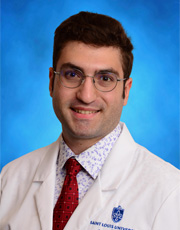
Erol Ikiz
Undergraduate institution: University of Illinois
Research: "Most of my undergraduate research was conducted in Kevin Hascup's lab at the Southern Illinois University School of Medicine Dale and Deborah Smith Center for Alzheimer's Research and Treatment. During my time there, I investigated the effects of D-methionine on mechanosensitive Piezo1 cation channels and their role in the microglial clearance of amyloid-beta plaques in Alzheimer's disease mice. While our findings were not statistically significant in regard to cognitive improvements, D-methionine did induce some interesting metabolic changes that may warrant further investigation. I have also pursued additional research opportunities at the University of Illinois at Chicago College of Pharmacy and the Mayo Clinic Center for Regenerative Biotherapeutics in Minnesota."
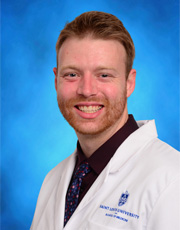
Spencer Schmid, Ph.D.
Undergraduate institution: University of Michigan
Department of Health Care Ethics
Research mentor: Erica Salter, Ph.D.
Research: "My undergraduate research was conducted at the University of Michigan's Center for Bioethics and Social Sciences in Medicine. I was fortunate enough to be engaged in a wide variety of research projects, including studying gendered differences in health care-provider burnout, end-of-life care policies involving terminally ill cancer patients, community-based participatory research initiatives studying allocation of scarce health care resources, and educational outreach related to chronic kidney disease. At SLU, I am pursuing my Ph.D. in health care ethics and am hoping to build upon the work I did in my undergraduate philosophy degree in the spheres of end-of-life decision-making, the appropriate role of genetic technologies in preventative medical care, deontological approaches to public health and more."
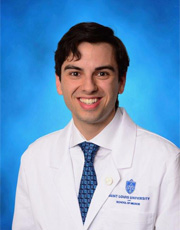
Jacob (JJ) Adler
Undergraduate institution: New York University
Department of Molecular Microbiology and Immunology
Research mentor: Long Ping Victor Tse, Ph.D.
Research: "My undergraduate research was in computational chemistry and chemical biology in the Arora Group at New York University. I developed an in silico quantum mechanics based workflow to analyze organometallic catalysts for efficient peptide synthesis. At SLU, I am pursuing my Ph.D. in the lab of Victor Tse in the MMI Department. Dengue virus is one of the most common mosquito-born illnesses - roughly half the world’s population living in at-risk regions - but current vaccines have limited approval for use in the dengue seropositive population. I am working on developing a vaccine which minimizes antibody dependent enhancement (ADE) making it safer for widespread usage in both seropositive and seronegative individuals. Additionally, I am developing an envelope protein library to allow for easy mapping and epitope determination of anti-dengue antibodies for eventual use in patient serum profiling."
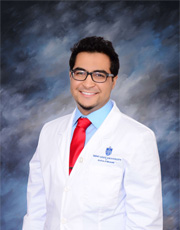
Yasser Hussaini
Undergraduate institution: University of Washington, Seattle
Department of Biochemistry and Molecular Biology
Research mentor: Enrico Di Cera, M.D.
Research: "Previously, in the Bruce Clurman lab at the Fred Hutchinson Cancer Center in Seattle,
I investigated cancer therapeutics and biochemistry at the intersection of the cell
cycle. Our group rectified an incomplete model of c-MYC degradation by the E3 ubiquitin
ligase FBXW7, the former being a notorious proto-oncogene. My work also involved assessing
therapeutic responses in-vitro and in-vivo to targeted therapies, for example against
the WEE1 kinase (whose dysregulation is implicated in a number of cancers), as well
as any corresponding inflammatory signaling changes in murine tumor grafts.
At SLU, I'm currently pursuing a Ph.D. in the Department of Biochemistry with the
Di Cera Lab, where I'm using protein engineering and structural biology tools to target
and treat disease. For example, clotting-factor coagulopathies like the Factor V Leiden
phenotype can be rectified by targeted proteolysis, provided a protein can be designed
to attack the disease-causing mutation. Additionally, in what will likely be my principal
thesis, several blood cancers and diseases remain vulnerable to targeted protein therapies
that leverage coagulation pathways, enabling broad-spectrum disease coverage while
maintaining specificity and minimizing side-effects."
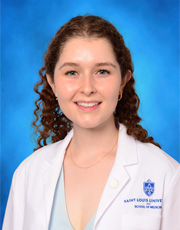
Lily McMorrow
Undergraduate institution: Georgetown UniversityDepartment of Health and Clinical Outcomes Research
Graduate mentor: Leslie Hinyard, Ph.D.
Research: "As a Ph.D. student in Health and Clinical Outcomes Research, I am currently studying qualitative and quantitative research methodology, developing skills for complex data analysis. I hope to continue my work evaluating and addressing the impact of social and structural inequity on health by applying an intersectional feminist lens to my research."
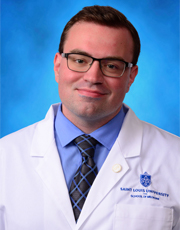
Zachary Foulks
Undergraduate institution: Missouri University of Science and Technology
Department of Biochemistry and Molecular Biology
Research mentor: Kyle McCommis, Ph.D.
Research: "My undergraduate research, conducted in the lab of Honglan Shi, Ph.D., primarily involved characterizing the biosynthetic pathway of pteridines in human epithelial breast cells with the final goal of identifying trends of these compounds in urine that can be used to detect and diagnose breast cancer. I also led a project to identify pheromones and other signaling biomolecules used by brown recluse spiders with an ultimate goal of spider population control. At SLU, I am in the lab of Kyle McCommis, Ph.D., where I am using cellular and mice models to investigate the role of diet and mitochondrial pyruvate carrier protein mutations in the development of liver and heart disease."
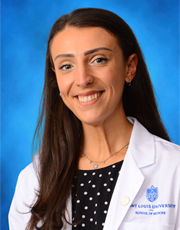
Samantha Cooke
Undergraduate institution: Carleton College
Department of Molecular Microbiology and Immunology
Research mentor: Elise Alspach, Ph.D.
Research: "I am currently working with Dr. Elise Alspach in the Department of Molecular Microbiology and Immunology I where we are studying sex differences in tumorigenesis and mechanisms, such as T-cell responses, which may be driving these differences."
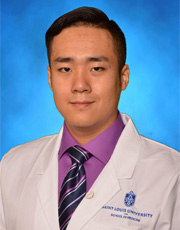
Di (Andy) Wu, Ph.D.
Undergraduate institution: University of Illinois at Urbana-ChampaignDepartment of Molecular Microbiology and Immunology
Research mentor: Rajeev Aurora, Ph.D.
Research: "My thesis work with Dr. Rajeev Aurora focused on the mechanism of T-cell mediated inflammation on bone quality and how it contributes to the pathogenesis of postmenopausal osteoporosis. My work utilized ovariectomize (OVX) mice as a model for the post-menopausal menopausal state and combined both immunology and bone histopathology techniques. My work showed that inflammation compromises bone quality in the form of disorganized bone matrix and diminished mechanical sensing of osteocytes before detectable changes in bone density. Additionally, previous work from the Auroa lab has shown that osteoclasts can induced CD8+ regulatory T-cells (Tcreg), which has a bone anabolic effect in OVX mice. I also investigated the effects of Tcreg induction on bone quality as a potential therapeutic target. My clinical interest is pathology, and my future research interest is to look at the role of T-cell biology, both inflammatory and tolerogenic, in the setting of autoimmune diseases."
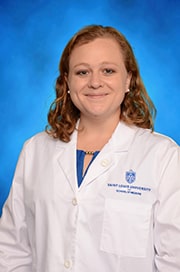
Elisabeth DeMarco, Ph.D.
Undergraduate institution: Purdue University
Department of Health and Clinical Outcomes Research
Research mentor: Leslie Hinyard, Ph.D.
Research: "My dissertation work with the AHEAD institute and Department of Health and Clinical Outcomes Research focused on the measurement, progression, and phenomenology of affective disorders among people with Parkinson's Disease. Through this work, I explored commonly used rating scales for anxiety and depression to find a new way of characterizing these symptoms that may better align with new schools of thought in psychological research and more readily discriminate mood symptoms from the somatic experiences and sleep disturbances that characterize Parkinson's Disease. Along the way, I collaborated with numerous faculty mentors - including my dissertation chair, Dr. Hinyard - and peers in a variety of disciplines to develop a well-rounded appreciation of study design, statistical analysis, literature review and appraisal, and academic writing."
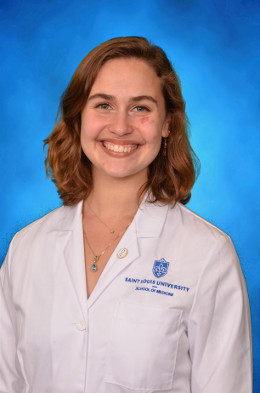
Stella Hoft, Ph.D.
Undergraduate institution: Pitzer College
Department of Molecular Microbiology and Immunology
Research mentor: Richard DiPaolo, Ph.D.
Research: "My Ph.D. work at SLU is conducted under Richard DiPaolo, Ph.D., within the Department of Molecular Microbiology and Immunology. My thesis work is focused on understanding how chronic gastric inflammation, either induced by autoimmunity or infection, instigates metaplastic changes in the tissue and ultimately drives gastric carcinogenesis. Using cutting-edge techniques like single-cell and spatial transcriptomics I am capable of understanding at the transcriptional level how the immune response triggers distinct epithelial cell transformations."
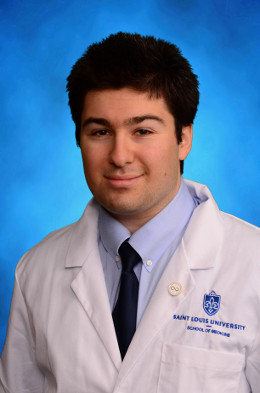
Robert Kousnetsov, Ph.D.
Undergraduate institution: Santa Clara University
Department of Molecular Microbiology and Immunology
Research mentor: Daniel Hawiger, M.D., Ph.D.
Research: "My research focuses on the use of single-cell technologies to better understand the functions of dendritic cells and T cells in the regulation of immune responses."
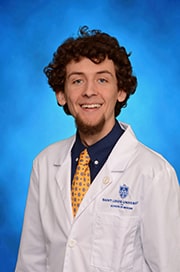
Reagan McGuffee, Ph.D.
Undergraduate institution: Millsaps College
Department of Biochemistry and Molecular Biology
Research mentor: David Ford, Ph.D.
Research: "My dissertation utilized LC-MS-based lipidomics techniques to investigate changes in plasmalogen phospholipids in sepsis. My studies revealed a decline in these lipids in the plasma of human sepsis patients. We attributed this to endothelial injury based on an in vitro endothelial endotoxemia model mirroring plasmalogen losses seen in vivo. Supplementation with plasmalogen precursors in this model rapidly replenished plasmalogen pools and appeared to confer antioxidant and anti-inflammatory benefits. Future studies will search for improved sepsis outcomes with the utilization of plasmalogen precursors alongside the standard of care."
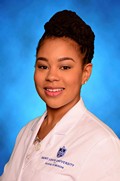
Monica Goodland, Ph.D.
Undergraduate institution: Missouri State University
Department of Pharmacology and Physiology
Research mentor: Susan Farr, Ph.D.
Research: My dissertation examined the impact of adenosine 3 receptor activation on memory impairment following traumatic brain injury and the implications for the development of dementia later in life. Our studies not only highlighted the importance of early intervention to prevent memory impairment but identified key molecular contributors to the disease processes of concussion and age-related dementia. Inflammation seems to be a potent driver of multiple complex pathologies that interact with genetic and environmental factors to cause memory impairment. In my future research, I hope to incorporate multi-modal therapies and non-invasive imaging to study the impact of neuroinflammation on learning, memory, and mental health disorders which may identify novel targets for therapeutic development.
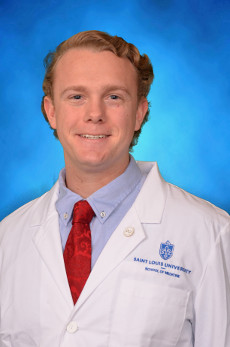
Alex Piening, Ph.D.
Undergraduate institution: Rockhurst University
Department of Molecular Microbiology and Immunology
Research mentor: Ryan Teague, Ph.D.
Research: "A key development in the field of cancer treatment has been the development of immunotherapies, biologic molecules that prime the immune system to specifically combat tumor cells. While checkpoint blockade immunotherapy has revolutionized cancer treatment, some patients still show no clinical response, and the mechanisms dictating therapeutic success remain largely unknown. My research in Ryan Teague’s lab broadly focuses on delineating factors that influence responses to immune checkpoint blockade therapy. Specifically, we are interested in understanding how diet, obesity, and obesity -associated comorbidities impact responses to anti-PD-1/CTLA-4 combination therapy in melanoma."
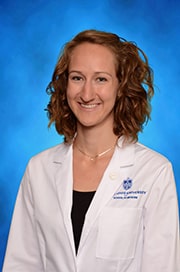
Lindsay (Lou) Vinarcsik, Ph.D.
Undergraduate institution: Cornell University
Department of Health Care Ethics
Research mentor: Erica Salter, Ph.D.
Research: "Through my previous work conducting research in both biomedical and humanities contexts, I have come to recognize the imperative to build more robust historical and philosophical frameworks undergirding contemporary medical practice. My experiences in cooperative living and the provision of “indigent care,” as well, have spurred my commitment to understanding the possibilities and pitfalls of community-based medicine. My dissertation focused on the history of medicine in the United States during the 20th century, with an eye toward the conceptual and political formations that informed (and continue to shape) the development of so-called "free clinics." My approach is both theoretical and practical, and my research will inform my future practice as a community physician. As a primary care practitioner, I will provide accessible, quality care with an emphasis on comprehensive sexual and reproductive health care."